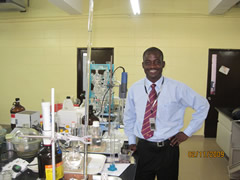Alltech Young Scientist - Mohammed Aliyu-Paiko - Working to Make Aquaculture more Sustainable

We created the Alltech Young Scientist? competition in 2006 to reward outstanding students in agricultural science. The program has grown from 87 students in 2006 to over 5,000 this year. Regional winners from all over the world will soon be traveling to Alltech?s annual symposium in Lexington, Kentucky to compete for global honors. The award presentation will take place Tuesday afternoon May 24th at symposium. We will be streaming the AYS awards ceremony and other symposium presentations live from Alltech?s Symposium website.
Mohammed Aliyu-Paiko is the Second place Alltech Young Scientist Winner in the Graduate category for the Asia Pacific region. He is from Nigeria, studying aquaculture at the Universiti Sains Malaysia. We asked Mohammed to tell us about himself and his research.
Q: Tell us a little bit about your research?
A: Generally, my PhD research is focused on the substitution of fish oil with vegetable oils (particularly from the Palm tree), as sustainable lipids sources in feeds for the commercial aquaculture of warm fresh water fish species. This is conceived as a strategy for reducing the cost of feeds, which in aquaculture, could account for 60% or more of the total cost of production. Fishmeal and fish oil have been identified by research to be the principal contributors to the rising and unsustainable cost of feeds in aquaculture.
Specifically however, in the research paper I submitted to the Alltech young scientist competition 2011, I monitored the regulation of the expression of genes of 2 enzymes which are responsible for the synthesis/accumulation of EPA and DHA in the liver of a freshwater fish (Snakehead), as a result of substituting Fish Oil with Crude Palm Oil (CPO) and Palm fatty acid distillate (PFAD) in their diets. The effects of the regulation of these genes on growth, feed utilization, body indices and liver Fatty Acids profile in the fish were also monitored, to determine the suitability of CPO and PFAD as fish feed ingredients.
Q: What inspired you to look at substitutes for fish oil in aquaculture feeds?
A: I wanted to contribute my own little quota in making aquaculture profitable and sustainable; to promote food production and security, in the effort towards reducing global hunger (especially in Africa). Global supply of food fish from capture fisheries is severely threatened, with many fish currently reported by FAO as over-fished, declining or depleted. On the other hand, aquaculture seems to be one of the long-term solutions for the production of fish for the ever increasing world population; however, it has also been reported to be one of the problems responsible for the declining fisheries production. This is because the principal ingredients used in aquafeed production (fishmeal and fish oil) are from marine pelagic species. Therefore, to make fish production through aquaculture sustainable, concerted efforts are required to reduce reliance on these expensive and unsustainable feed ingredients. Vegetable oils (CPO and PFAD) may be viable substitutes for fish oils. Understanding the regulation of genes responsible for synthesis/accumulation of DHA and EPA (the principal fatty acids desired in fish products) is important for providing justification for such substitution.
Q: What would you like to do when you graduate?
Research in Aquaculture nutrition (including molecular work) is quite interesting. Upon graduation, I would like to continue in the same area, possibly in postdoctoral studies. I have made up my mind to pursue a career as an academic researcher, to learn from experts in my area and share my experiences to also help to develop others. This, I believe, is the little I could offer to help develop my local community, my nation and humanity at large, to make this world a better place.
All Categories
Archives
- 五月 2014 (6)
- 二月 2014 (1)
- 八月 2013 (1)
- 七月 2013 (1)
- 六月 2013 (4)
- 五月 2013 (17)
- 九月 2012 (1)
- 八月 2012 (22)
- 七月 2012 (1)
- 五月 2012 (24)
- 四月 2012 (2)
- 三月 2012 (12)
- 一月 2012 (7)
- 十二月 2011 (10)
- 十一月 2011 (12)
- 十月 2011 (2)
- 九月 2011 (4)
- 八月 2011 (12)
- 七月 2011 (10)
- 六月 2011 (11)
- 五月 2011 (35)
- 四月 2011 (4)
- 三月 2011 (10)
- 二月 2011 (12)
- 一月 2011 (13)







